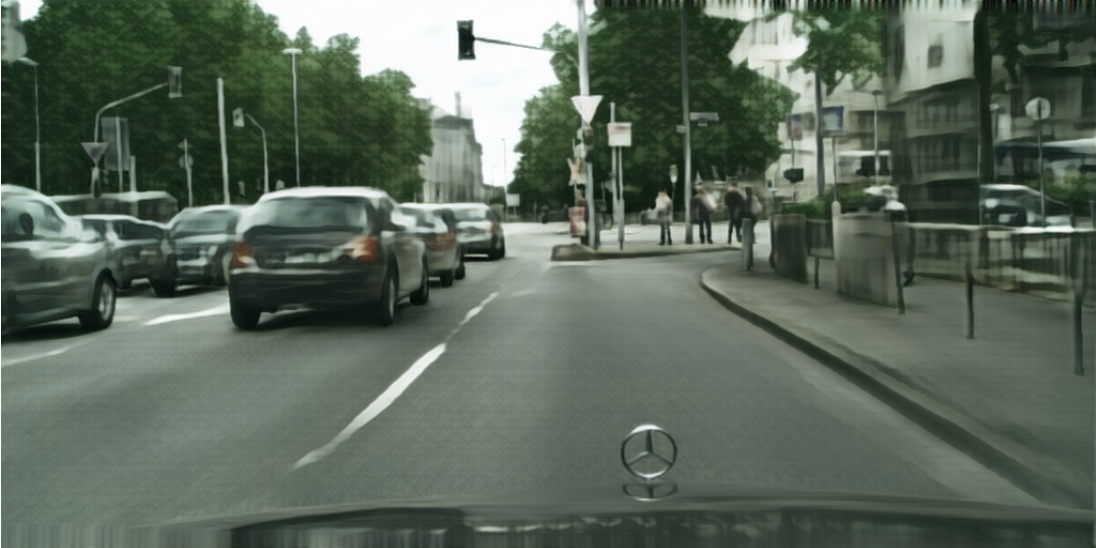AI paints lifelike cityscape from memory alone
Reports say program could improve realism in video games

A free daily email with the biggest news stories of the day – and the best features from TheWeek.com
You are now subscribed
Your newsletter sign-up was successful
Researchers from Stanford University in California and Intel have created an artificial intelligence (AI) program that can paint a cityscape from memory.
Alphr says that the system, developed by PhD student Qifeng Chen and Intel, uses "thousands of reference images" to learn where cars, pavements and road signs are located in a city before painting an image depicting a real-world environment.
The image, however, "technically doesn't exist at all" and is simply formed by the AI program remembering what it has learned from "3,000 images of German streets" and painting its own interpretation of a city from memory alone, the website says.
The Week
Escape your echo chamber. Get the facts behind the news, plus analysis from multiple perspectives.

Sign up for The Week's Free Newsletters
From our morning news briefing to a weekly Good News Newsletter, get the best of The Week delivered directly to your inbox.
From our morning news briefing to a weekly Good News Newsletter, get the best of The Week delivered directly to your inbox.
To help the program paint the image, TheNextWeb says researchers create a "paint by numbers" template that consists of basic coloured blocks that outline a conventional cityscape.
The program could have significant benefits for video game creators, the site says, as it could be used to help open-world titles such as Grand Theft Auto produce more realistic cities.
But there's room for improvement. NewScientist says the images are blurry because the network "isn't able to fill in all the details we expect in photos." An improved version of the AI program is already in development that's expected to improve the quality of the images.
Chen told the website that the program could be used with voice commands in the future, as "it'd be great if you could conjure up a photorealistic scene just by describing it aloud".
A free daily email with the biggest news stories of the day – and the best features from TheWeek.com
-
 The environmental cost of GLP-1s
The environmental cost of GLP-1sThe explainer Producing the drugs is a dirty process
-
 Greenland’s capital becomes ground zero for the country’s diplomatic straits
Greenland’s capital becomes ground zero for the country’s diplomatic straitsIN THE SPOTLIGHT A flurry of new consular activity in Nuuk shows how important Greenland has become to Europeans’ anxiety about American imperialism
-
 ‘This is something that happens all too often’
‘This is something that happens all too often’Instant Opinion Opinion, comment and editorials of the day
-
 Claude Code: Anthropic’s wildly popular AI coding app
Claude Code: Anthropic’s wildly popular AI coding appThe Explainer Engineers and noncoders alike are helping the app go viral
-
 Will regulators put a stop to Grok’s deepfake porn images of real people?
Will regulators put a stop to Grok’s deepfake porn images of real people?Today’s Big Question Users command AI chatbot to undress pictures of women and children
-
 Most data centers are being built in the wrong climate
Most data centers are being built in the wrong climateThe explainer Data centers require substantial water and energy. But certain locations are more strained than others, mainly due to rising temperatures.
-
 The dark side of how kids are using AI
The dark side of how kids are using AIUnder the Radar Chatbots have become places where children ‘talk about violence, explore romantic or sexual roleplay, and seek advice when no adult is watching’
-
 Why 2025 was a pivotal year for AI
Why 2025 was a pivotal year for AITalking Point The ‘hype’ and ‘hopes’ around artificial intelligence are ‘like nothing the world has seen before’
-
 AI griefbots create a computerized afterlife
AI griefbots create a computerized afterlifeUnder the Radar Some say the machines help people mourn; others are skeptical
-
 The robot revolution
The robot revolutionFeature Advances in tech and AI are producing android machine workers. What will that mean for humans?
-
 Separating the real from the fake: tips for spotting AI slop
Separating the real from the fake: tips for spotting AI slopThe Week Recommends Advanced AI may have made slop videos harder to spot, but experts say it’s still possible to detect them